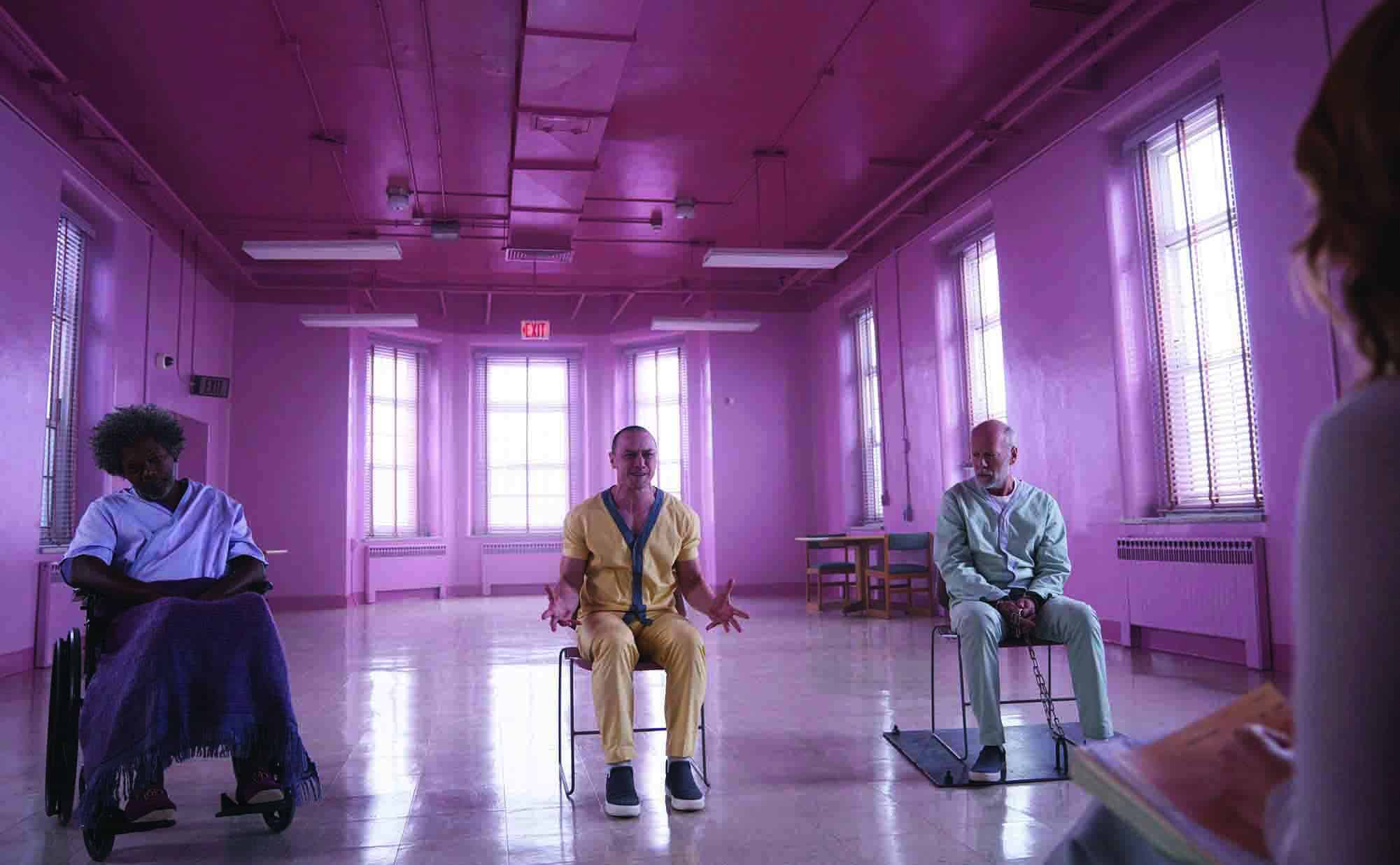Glass Review

author: ethan butterfield | a&c editor

Breaking away from the norm. / Courtesy of Universal Pictures*
The best “huh?” film in a while
I’m quite excited for the up and coming February break that’s just on the horizon. Lord knows I can’t wait to kick back, relax, and catch up on my list of films to watch and games to play…as well as catching up on my readings…of course. Actual versus false break time usage aside, films are going be a pretty big part of my time off one way or another. Why? Well, for one, I’m taking a film class, so it’s more than likely that I’ll have to analyze some cinematic pieces on my days off, and (second), there’s just too many new films out right now that I want to see. The Mule, Alita: Battle Angel, Cold Pursuit, Bumblebee, The Lego Movie 2… okay, maybe not that last one, but you see my point.
Out of all the films listed above, though, there was one on my watchlist I finally got to see, Glass, directed by M. Night Shyamalan. The third film in what some are calling the Eastrail 177 trilogy, Glass follows (and somewhat completes) the stories of David Dunn (played by Bruce Willis of Die Hard fame), Kevin Wendall Crumb (portrayed by James McAvoy, the new Professor X), and, last but not least, Mr. Glass (played by the legendary Samuel L. Jackson)
The trilogy itself is made up of Unbreakable, which was released back in 2000, Split, which came out in 2016 and (of course) Glass. Make no mistake, though, despite the lengthy time gap in which these films were released, all of them do an excellent job in bringing together a very grounded superhero world, as well as very grounded superhero characters. If you’re looking for an epic comic book film with big battles and even bigger stakes, look to Marvel and DC for that. If you’re looking for larger than life characters that are still very human because of the world that they reside in and because of who they are on a mental and emotional level, then the Eastrail 177 trilogy is the one for you (even though it is a bit preachy with the “this is what a comic book is” storytelling). All the main characters in this trilogy, especially when brought together in Glass, are so interesting that, despite whether they’re heroes or villains, you’re invested in them 100 per cent. Heck, even going back to Split when there was only one of the main characters, it was still incredibly interesting. Yes, Kevin Wendall Crumb wasn’t a good guy in that film, he was a very conflicted character, but you still felt his pain and you wanted to know what happened to him that got him to that point in his life. So, imagine taking that one interesting character, and multiplying it by three for the final film. Sounds like a hell of a movie, right?
Well… kind of, despite my boasting about interesting and unique characters, Glass only really seems to focus on one in particular, even though it’s the end of the trilogy, Mr. Glass being that one. Now, don’t get me wrong, there’s still a good focus on David and Kevin in the film, but the movie itself feels like it’s working towards finishing off Mr. Glass’s arc from Unbreakable rather than tying off all three characters arcs together. I found this decision to be a bit strange as, not only is David’s arc from Unbreakable not really complete (even though he was the hero of that film), but the amount of time we spent getting invested in Kevin’s arc from Split doesn’t really feel resolved either. So, long story short, it feels as though Glass is a film that was meant to tie off all of these interesting character’s arcs but, instead, only really winded up tying up Mr. Glass’s arc, which feels as though we, as viewers, went through three films worth of intrigue and pacing, with only one films worth of payoff (if you see what I’m getting at.) That being said, though, David and Kevin do get…well, it’s hard to explain.
I will admit, this film is kind of tricky to do a review for. Not because there isn’t anything to talk about, it’s just that talking about it kind of ruins it…in a sense. For example (no spoilers ahead, so no worries about it being ruined), when looking at the end of Glass, the best way I could describe it without giving anything away is that a “thing” happens (sorry John, I know you hate air quotes) and that “thing” leads to the realization of another “thing” that causes a “thing” to happen. Super informative, I know.
If you haven’t seen Glass, I would recommend it for the grounded world and for the equally grounded and dynamic characters, I would also recommend it for the plot twists that M. Night Shyamalan has become so…famous? Infamous?… that he’s become so known for. Honestly, this film isn’t bad by any means, it’s more so a film that makes you go “Huh?” and then “Ooooh” and then, finally, “Wha?” Basically, stay for the intrigue surrounding the characters, leave for preachy “this is what a comic book is” storytelling.








